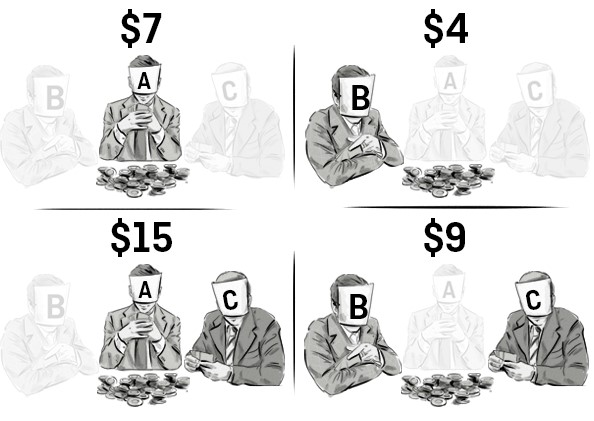
Project Details
Spring Semester 2020
This is the website for the course entitled "Introduction to Game Theory" in the spring semester of 2020.
***COVID-19 Update: Lectures will be made available here and at protected links for direct download. The first lectures will be uploaded by May 1, 2020, and all lectures will be available by the time the course was originally scheduled to take place.
The block course was originally going to be held in 2 groups due to capacity restrictions, which of course now has become irrelevant, so we are glad we agreed to not limit student numbers in the course planning phase.
Course material for students will be published below, with announcements being made by emails sent via edoz. Course catalogue information about the course may be found here.
Description:
This course introduces the foundations of game theory. It treats models of social interaction, conflict and cooperation, the origin of cooperation, and concepts of strategic decision making behavior. Examples, applications, and the contrast between theory and empirical results are particularly emphasized. We shall also discuss some game theory of the current COVID-19 pandemic.
Lecturers: Heinrich and Bary (H. Nax and B. Pradelski)
About Game Theory:
Game theory provides a unified language to study interactions amongst different types of individuals (e.g. humans, firms, nations, animals, etc.). It is often used to analyze situations involving conflict and/or cooperation. The course introduces the basic concepts of both non-cooperative and cooperative game theory (players, strategies, coalitions, rules of games, utilities, etc.) and explains the most prominent game-theoretic solution concepts (Nash equilibrium, sub-game perfection, Core, Shapley Value, etc.). We will also discuss standard extensions (repeated games, incomplete information, evolutionary game theory, signal games, etc.).
In each part of the course, we focus on examples and on selected applications of the theory in different areas. These include analyses of cooperation, social interaction, of institutions and norms, social dilemmas and reciprocity as well as applications on strategic behavior in politics and between countries and companies, the impact of reciprocity, in the labor market, and some applications from biology. Game theory is also applied to control-theoretic problems of transport planning and computer science.
As we present theory and applications, we will also discuss how experimental and other empirical studies have shown that human behavior in the real world often does not meet the strict requirements of rationality from "standard theory", leading us to models of "behavioural" and "experimental" game theory.
Important:
Course material is intended for personal use in the context of this course only; redistributing, citing or publishing any of the material is strictly prohibited. If prompted, please enter your ETH username and password to download course materials.
Below is the preliminary schedule.
Note that we will have a remote John von Neumann Lecture on May 29, 2020. See info here.
Some preliminary Course Material from previous editions of the course can be found here (and even older here):
| Lecture | Presenter | Lecture | Reading |
|---|---|---|---|
| 1 | Heinrich Nax |
Introduction: |
College Admissions and the Stability of Marriage by D. Gale and L. S. Shapley |
| 2 | Heinrich Nax |
Cooperative game theory: |
COOPERATIVE GAMES: CORE AND SHAPLEY VALUE by R. Serrano |
| 3 | Bary Pradelski | Non-cooperative game theory: Normal form | see book chapter at link distributed via email |
| 4 | Bary Pradelski |
The Nash equilibrium: |
Nash's PhD thesis |
| 5 | Bary Pradelski | Non-cooperative game theory: dynamics | no reading |
| 6 | Bary Pradelski | Automata, matching and foraging behavior of bees by F. Thuijsman et al. | |
| 7 | Heinrich Nax |
Applications: |
A Model-Free Approach to Wind Farm Control Using Game Theoretic Methods by J. Marden et al. |
| 8 | Heinrich Nax |
|
Progress in Behavioral Game Theory by C.Camerer [for measuring social preferences see dedicated recording at link distributed via email] |
| 9 | Heinrich Nax | Bargaining | The Nash Bargaining Solution in Economic Modelling by K. Binmore et al. |
| 10 | Bary Pradelski |
|
|
| 11 | tbc | von Neumann Lecture | |
| 12 | Heinrich Nax | Feedback session |
- Documents Download the documents related to this project here
Lecture 1_Intro Lecture 2_Core_Shapley Lecture 2_Matching Lecture 7_Distributed Control Lecture 3_Utilities Lecture 4_Best replies and Nash Lecture 4_Refinements Lecture 8_Behavioral Lecture 9_Bargaining Lecture 5_Extensive Lecture 6_Evolution Lecture 10_Auctions Project Grading Rules
- Category Lecture materials










